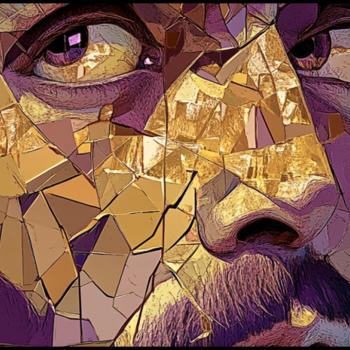Lectionary Reflections
2 Samuel 1:1, 17-27
June 28, 2015
5th Sunday After Pentecost
During the lectionary cycle of the saga of Samuel, Saul, and David, much by necessity must be overlooked. The story is so rich and so detailed that any retelling in ten short weeks will by necessity be something of a Reader's Digest version. This week forces us to skip from David's defeat of Goliath all the way past the death by suicide of Saul, making David's pathway to the throne now inevitable. Yet he has a few very loose ends that he needs to tie up before that path can become a smooth one. If you think that modern day politicians invented the art of the "spin," you need to hear how cleverly David rereads the death of Saul and Jonathan in order to pave his way to the kingship of Israel.
First, let's define spin. Spin should be seen as the many ways that events and words can be viewed in order to make the interpreter of those events and words, or the supporter of that interpreter, look much better than they in fact may be. A classic example is when former president Bill Clinton, accused of an affair with a young intern, Monica Lewinsky, tried in every way that he could to make the event appear to be quite different than it was. He even resorted to a ridiculous attempt to redefine the word "is" in the vain attempt to describe the affair as somehow non-sexual, or not finally serious at all. He failed miserably, and was subsequently impeached, though acquitted by the Senate.
A more recent example is the disastrous war in Iraq, instigated by former president George Bush, based on the conviction that Saddam Hussein was stockpiling hordes of "weapons of mass destruction" and therefore needed to be stopped before he unleashed them on his enemies, including the U.S. When no such weapons were found, the reason for the costly war became our desire to "spread peace and democracy in the Middle East." As the war spiraled down to chaos and confusion, various other rationales were trotted out for public consumption, none of which carried much value. The "spin" was on, but we unfortunately are faced with a continued Middle East debacle that shows few signs of abating soon.
Clinton and Bush have nothing on King David, whose own spin was rotating nearly three thousand years ago. With David's main rival, Saul, and his chief son, Jonathan, safely dispatched in a battle on Mt. Gilboa, David has several obvious problems. First, while Saul is being defeated by that implacable foe, the Philistines, David has been living in a Philistine city, Ziklag, given to him by his would-be master, Achish, the king of Philistine Gath. Not only has David been living in Ziklag for eighteen months, while the Philistines are pressing Saul and Israel harder and harder, he has grown rich, raiding Amalekite encampments to the west and south while lying to Achish that he is really raiding Judean camps, his own people, thus making himself odious to them and presumably an ally of Achish forever.
His second problem is that he fled to the Philistines to escape the rampages of Saul, who tried several times to murder him. Because that is so, many would think that David would be very glad indeed to celebrate the death of the king, all the better to pave his way to the throne for himself. Gloating might be in order and not completely unexpected. His third problem is his relationship to Jonathan, known by many to be quite close. On the day of David's defeat of Goliath, Jonathan, quite publically, removed his sword, his armor, even his outer tunic, and handed all to David as a sign of fealty to the vanquisher of the giant. Jonathan himself was twice threatened with death by his father and saved David's life, choosing him over that same father, and divesting himself of his own future kingship in favor of David. Given these three problems, watch David begin his spin.
First, at the beginning of the epic, to be known henceforth and taught to Israel as "The Bow" or the "Song of the Bow" (2 Sam. 1:18), David describes Saul as the "glory of Israel," as one of the "mighty fallen" (2 Sam. 1:19). Later he will describe Israel's first king as one who "clothed the daughters of Israel in crimson luxury," adorning their clothes "with gold" (2 Sam. 1:24). There is no mention whatever of Saul's murderous rages, his attempted murders both of his son and of David.
Second, David wants no celebrations or even knowledge of Saul's defeat announced in any Philistine city, lest the uncircumcised daughters of the pagan Philistines rejoice (2 Sam. 1: 20). David showed no desire whatever to label his Philistine hosts as either "uncircumcised" or pagan while he was living among them.
Third, his treatment of Jonathan is careful and clever. He describes his relationship to the very popular son of Saul as "a love passing the love of women." This has led more than a few modern commentators to suggest that their relationship was some sort of homosexual one, a judgment that moves well beyond any sort of proof. But note exactly how David describes his love relationship to Jonathan. "I am distressed because of you, my brother Jonathan; you were a great friend to me; your love for me was wonderful, even more than women's love" (2 Sam. 1:26). David describes his relationship to Jonathan as one of friend, while he suggests that Jonathan's love for him was indeed deep and profound. There is no indication in the long story that we have read up to now that David in fact loves Jonathan; he is very glad for his help against Saul, but love for him is entirely another question. Thus, does David spin that relationship, quieting those who would find something unseemly in it, and yet indicating real distress at his death.





